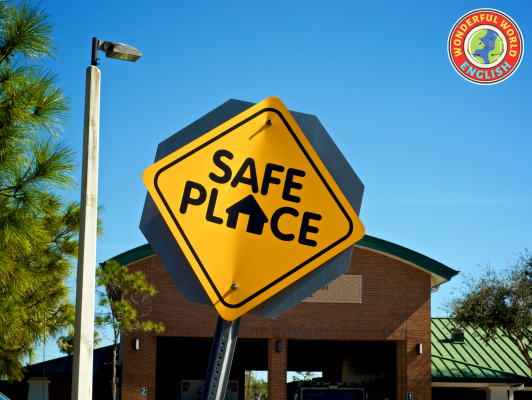Contents
Toggle
Meet David De’ Ath, founder, editor, and writer at Wonderful World English. With his extensive background as an English teacher, David provides valuable insights and practical tips on ESL for students and teachers alike.
When considering relocation, safety is a paramount concern for many individuals, especially for those who prefer an English-speaking environment.
English-speaking countries offer a sense of familiarity with the language, which can be a significant factor in feeling secure and integrated into a new community.
Moreover, these countries often have robust legal systems and social structures that contribute to overall safety.
Understanding the subtle and prominent features that contribute to English-speaking nations’ safety can vastly simplify choosing a destination that aligns with one’s personal safety criteria.
Various indices and studies provide rankings on the safety and security of countries around the world, factoring in elements like crime rates, political stability, and emergency services.
When combined with cost and quality of living evaluations, these indices can serve as a valuable guide for those seeking a secure and comfortable English-speaking country to reside in.
Additionally, considering cultural compatibility, the prevalence of English, and the natural and social environments are essential for those who want to maintain a sense of community and well-being in their new home.
Key Takeaways
- Safety is a top priority for individuals seeking to live in English-speaking countries.
- Rankings and indices offer insights into the relative safety and quality of living.
- Language and cultural affinity contribute to the favorable perception of safety.

Safety and Security Rankings
This section assesses English-speaking countries through the lens of widely respected safety metrics and specific country performance, with a focus on the Global Peace Index and observed crime rates.
Global Peace Index Findings
According to the Global Peace Index (GPI), a well-regarded measure that gauges the safety and security of countries, several English-speaking nations often rank highly.
The GPI considers factors such as societal safety, the extent of ongoing domestic and international conflict, and the degree of militarization.
Among the consistently top-performing English-speaking countries in terms of safety, one finds Iceland renowned for its minimal conflict and excellent societal safety measures.
Low Crime Rates Worldwide
Low crime rates are central to a community’s safety and among English-speaking countries, this is a pivotal area of pride.
Countries such as Denmark have been cited for their exceptionally low crime rates.
Another example is Singapore, despite being a densely populated urban nation, boasts a remarkably low crime rate, testifying to its stringent law enforcement and rigorous social policies.
Similarly, countries like Sweden and Finland are acknowledged for their strong social safety nets and low crime rates, illustrating a consistent dedication to communal well-being and individual safety.
Check out the link below for a guide on the BEST English-speaking countries to live in according to the Quality of Life Index!
Related: Best English-Speaking Countries to Live in (Top 12)

Cost and Quality of Living
Cost of living and quality of life are pivotal when evaluating the safest English-speaking countries.
In places like India, the cost is notably low, with monthly expenses for a city apartment ranging significantly.
For US expatriates, countries like Brazil offer a stable quality of life with the average cost of a 2-bedroom apartment under $100,000.
Other countries might have a higher cost of living index, but they offset this with robust social programs that contribute to overall welfare.
Expensive nations often justify their costs with advanced healthcare, education, and infrastructure that contribute to a higher standard of living.
A country’s wealth is generally a good indicator of its quality of living, but it’s also important to assess the distribution of that wealth and the accessibility of services.
The table below outlines a general comparison:
| Country | Cost of Living Index | Social Programs | Average Housing Cost |
|---|---|---|---|
| India | Low | Moderate | $150 – $600/month |
| Brazil | Moderate | Good | $97,275.17 (2-bedroom flat) |
| European countries | High | Excellent | Varies |
It’s important to factor in the living costs against personal income levels to gauge the true affordability within each nation.
For more insights into the CHEAPEST English-speaking countries to live in, check out the guide below!
Related: Cheapest English-Speaking Countries to Live in (Top 6)

Cultural and Language Considerations
When choosing the safest English-speaking countries to live in, one must weigh cultural and language aspects.
A country’s English proficiency levels and the presence of expatriate communities can significantly impact the quality of life for English-speaking residents.
English Proficiency Levels
In many safe, English-speaking countries, the population’s ability to speak and understand English can vary.
For instance, Canada is known for its high levels of English proficiency, serving as a comfortable environment for English-speaking expats.
Similarly, in the United Kingdom, English is the official language spoken proficiently across the nation, facilitating seamless integration for newcomers.
Expatriate Communities
The size and supportiveness of expatriate communities are also important.
Countries like Australia have substantial expatriate populations, providing a network for social and professional support.
This aspect is crucial for those looking to maintain a sense of community in a new country.
Finding the Best English-Speaking Country to Reside In discusses Canada’s favorable conditions for expats, including its low crime rates and emphasis on public safety, which are often significant considerations for those moving abroad.

Natural and Social Environment
Diverse climates and considerable political stability define English-speaking countries’ Natural and Social Environments.
The climates range from tropical to temperate, catering to various preferences, while social and political stability provides a backdrop for secure living environments and dependable governance structures.
Climate and Weather Patterns
Climate and weather patterns significantly impact the livability of any country.
For instance, countries such as New Zealand and Canada enjoy temperate climates with distinct seasons, whereas Australia typically has a warmer climate with a spectrum ranging from tropical in the north to temperate in the south.
The climate influences lifestyle choices and contributes to occasional natural disasters, such as wildfires in Australia or blizzards in Canada.
Social and Political Stability
The social fabric and political climate of a country are paramount in establishing its safety.
English-speaking countries often demonstrate high degrees of political stability, with established democratic processes and independent judiciaries.
Countries like the United Kingdom boast a long tradition of stable governance, discouraging violent demonstrations and fostering a safe environment.
Similarly, the political scene in New Zealand is notable for its transparency and efficiency, which further solidifies its status as a secure destination.

Destination Specifics
When considering the safest English-speaking countries to travel or relocate to, it’s important to review each destination’s specific characteristics.
This section breaks down the safety and English language prevalence in different regions around the world.
Europe
In Europe, Ireland and Malta stand out for their high levels of English proficiency among the local populations.
Ireland is known for its friendly locals and relatively low crime rates, making it a popular destination for English-speaking expatriates and travelers alike.
Malta also boasts a rich cultural tapestry with a strong historical British influence, leading to widespread English usage and a reputation for safety.
Furthermore, despite not being predominantly English-speaking, Spain is noted for its large English-speaking population, particularly within expat communities and tourist areas, enhancing its appeal to those seeking an English-friendly environment within Europe.
Asia and Oceania
In Asia, Singapore ranks high for both safety and English proficiency.
With English being one of its official languages, communication is incredibly accessible.
The nation’s strict laws contribute to its status as one of the safest countries in the region.
Malaysia and the Philippines also have high levels of English speakers, aiding in smooth communication for travelers.
In Oceania, both Australia and New Zealand are known for their high standards of living and widespread use of English, paired with strong safety records.
North America
Canada and the United States are prominent English-speaking countries with robust legal systems and widespread safety measures.
Canada, in particular, is consistently ranked as one of the safest countries globally.
In the Caribbean region, islands like Jamaica, Bermuda, Barbados, Trinidad and Tobago, and the Bahamas not only offer English as the main language but also possess stunning landscapes and are regarded as relatively safe for tourists, with varying degrees of safety precautions advised.
| Country | Safety Features and Rankings | English Proficiency | Notable Attributes |
|---|---|---|---|
| Iceland | High Global Peace Index ranking, minimal conflict | Moderate | Excellent societal safety measures |
| Denmark | Low crime rates | High | Strong social safety nets |
| Singapore | Low crime rates, high safety ranking | High | Stringent law enforcement, rigorous social policies |
| Sweden | Low crime rates | High | Strong social safety nets |
| Finland | Low crime rates | High | Strong social safety nets |
| Canada | High English proficiency, low crime rates, high safety ranking | Very High | Favorable conditions for expats, emphasis on public safety |
| United Kingdom | The official language is English, high safety standards | Very High | Stable governance, seamless integration for newcomers |
| Australia | High standards of living, widespread use of English, strong safety records | Very High | Substantial expatriate populations |
| New Zealand | Widespread use of English, strong safety records | Very High | Temperate climate, political stability |
| Ireland | Low crime rates, high English proficiency | Very High | Friendly locals, popular among expatriates |
| Malta | High English proficiency, reputation for safety | High | Rich cultural tapestry, historical British influence |
| United States | Robust legal systems, widespread safety measures | Very High | Diverse environments, substantial expatriate communities |
| Jamaica | English as the main language, relatively safe for tourists | High | Beautiful landscapes, certain safety precautions advised |
| Bermuda | English-speaking, regarded as relatively safe | High | Stunning landscapes |
| Barbados | English-speaking, considered relatively safe | High | Attractive destination, safety precautions advised |
| Trinidad and Tobago | English-speaking, relatively safe for tourists | High | Diverse culture, safety measures advised |
| Bahamas | English as the main language, relatively safe for tourists | High | Idyllic settings, varying degrees of safety precautions |

Conclusion
Selecting an English-speaking country to live in requires balancing factors like safety, cost of living, language familiarity, and cultural fit.
Safety rankings, such as the Global Peace Index, highlight countries like Iceland for their exceptional peace, while low crime rates in nations like Denmark and Singapore emphasize community safety.
The cost and quality of living vary, with some countries offering affordable living but others providing higher standards at a higher cost.
English proficiency and supportive expat communities in places like Canada and Australia ease integration for newcomers.
The natural and social environments, including climate and political stability, are crucial in the overall living experience.
Choosing the right English-speaking country involves a comprehensive evaluation of these factors to find a secure, comfortable, and culturally compatible home.
We hope you found value in this guide.
Have a wonderful day!
Image Attribution: All images licensed via canva.com





